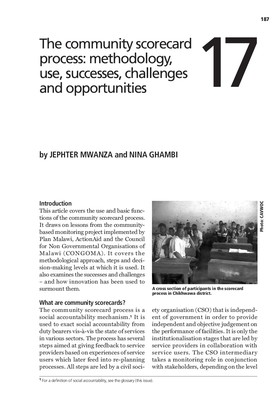The community scorecard process: methodology, use, successes, challenges and opportunities (PLA 64)

Budget tracking is not viable if national and local governments lack openness and fail to provide timely information on budget allocations. The alternative is to look at the final service provided at the point of access – hence the community scorecard approach. This article covers the use and basic functions of a community scorecard process. It is a social accountability mechanism used to exact social accountability from duty bearers visà-a-vis the state of services in various sectors. The process fosters unity and collective action within communities for engaging with service providers. Here, the authors draw on lessons from the community-based monitoring project implemented by Plan Malawi, ActionAid and the Council for Non Governmental Organisations of Malawi (CONGOMA). It covers the methodological approach, steps and decision-making levels at which it is used. It also examines the successes and challenges – and how innovation has been used to surmount them.
Participatory Learning and Action (PLA, formerly PLA Notes) is the world's leading series on participatory approaches and methods. PLA publishes articles on participation aimed at practitioners, researchers, academics and activists. All articles are peer-reviewed by an international editorial board. See: www.planotes.org
Keywords: Children, youth, young people, child rights, participatory governance.
Cite this publication
Available at https://www.iied.org/g03207